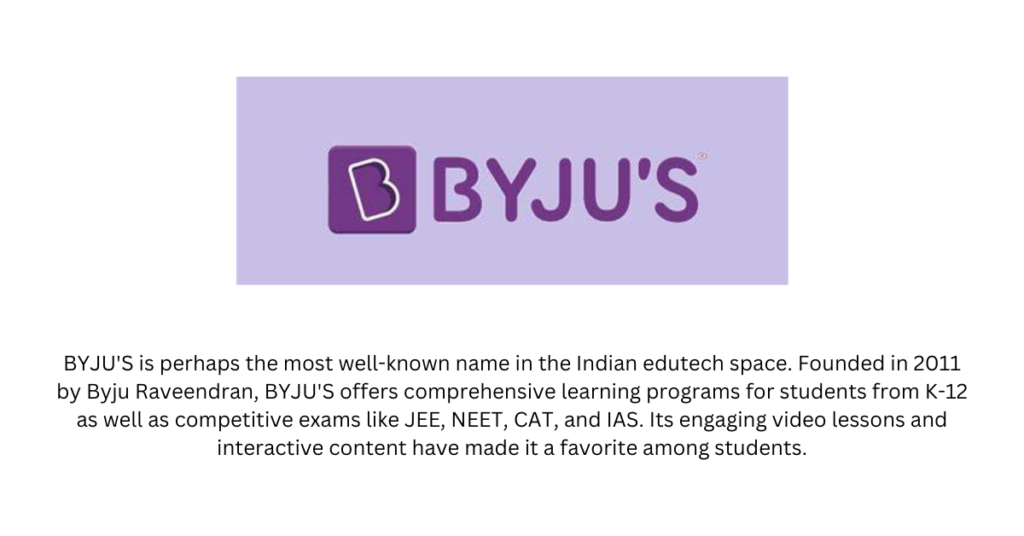Discover the top 10 social impact startups in India revolutionizing healthcare, education, clean energy, and more. Learn about their innovative solutions, significant impacts, and contributions to sustainable and inclusive development.
India, with its vast demographic diversity and myriad socio-economic challenges, has become a fertile ground for social impact startups. These enterprises aim to address pressing issues like education, healthcare, financial inclusion, and environmental sustainability through innovative and scalable solutions. Here are ten of the most influential social impact startups in India that are making a significant difference
Table of Contents
1. BYJU’S

| Attribute | Details |
|---|---|
| Founder | Byju Raveendran |
| Founded | 2011 |
| Headquarters | Bengaluru, Karnataka, India |
| Website | byjus.com |
| Sector | Education Technology |
| Key Innovations | Adaptive learning, personalized education |
| Impact | Improved learning outcomes, access to quality education across India |
Overview: BYJU’S, founded by Byju Raveendran in 2011, has become India’s largest online learning platform. It offers educational content for students from kindergarten to competitive exam aspirants, covering a wide range of subjects through engaging video lessons and interactive quizzes.
Innovations: BYJU’S revolutionized the traditional education system by blending technology with personalized learning. Their adaptive learning programs use data analytics to tailor educational content to each student’s learning pace and style, making education more effective and enjoyable.
Impact:
- Access to Quality Education: BYJU’S has made quality education accessible to students across India, including those in remote areas.
- Improving Learning Outcomes: Students using BYJU’S have shown improved academic performance and better conceptual understanding of subjects.
- Enhancing Teacher Effectiveness: The platform complements traditional teaching methods, helping teachers by providing supplementary materials and tracking student progress.
2. Selco India

Selco India – Top 10 Social Impact Startups in India
| Attribute | Details |
|---|---|
| Founder | Harish Hande |
| Founded | 1995 |
| Headquarters | Bengaluru, Karnataka, India |
| Website | selco-india.com |
| Sector | Renewable Energy |
| Key Innovations | Customized solar solutions, affordable financing |
| Impact | Enhanced energy access, improved livelihoods, reduced carbon footprint |
Overview: Selco India, founded by Harish Hande in 1995, focuses on providing sustainable energy solutions to underserved communities in India. They aim to alleviate energy poverty through the adoption of solar power technologies.
Innovations: Selco designs and implements customized solar energy solutions tailored to the needs of rural and urban poor communities. They offer affordable financing options and technical support, making solar power accessible even in remote areas.
Impact:
- Energy Access: Selco has brought electricity to thousands of households and businesses that previously relied on costly and unreliable energy sources.
- Improving Livelihoods: By reducing energy costs, Selco helps entrepreneurs and small businesses increase productivity and profitability.
- Environmental Benefits: Their initiatives promote sustainable development by reducing carbon emissions and dependence on fossil fuels.
3. Arogya World
| Attribute | Details |
|---|---|
| Founder | Nalini Saligram |
| Founded | 2010 |
| Headquarters | Bengaluru, Karnataka, India |
| Website | arogyaworld.org |
| Sector | Healthcare |
| Key Innovations | mDiabetes program, mobile health education |
| Impact | Increased health awareness, reduced incidence of NCDs |
Overview: Arogya World is a global health organization with a strong presence in India, focusing on preventing non-communicable diseases (NCDs) through lifestyle changes and health education.
Innovations: Their mDiabetes program leverages mobile technology to deliver diabetes prevention messages to millions of individuals across India. They collaborate with local health authorities and communities to promote healthy behaviors.
Impact:
- Health Awareness: Arogya World’s initiatives have raised awareness about the risk factors of NCDs and promoted preventive healthcare measures.
- Behavioral Change: Through targeted messaging and community engagement, they have encouraged people to adopt healthier lifestyles, reducing the incidence of diabetes and related diseases.
- Scalability: Their mobile-based approach allows for scalability and reach, making health education accessible to diverse populations.
4. Ergos

Ergos – Top 10 Social Impact Startups in India
| Attribute | Details |
|---|---|
| Founder | Praveen Kumar |
| Founded | 2012 |
| Headquarters | Bengaluru, Karnataka, India |
| Website | ergos.in |
| Sector | Agriculture Technology |
| Key Innovations | GrainBank model, tech-driven warehousing |
| Impact | Increased farmer income, reduced post-harvest losses, financial inclusion |
Overview: Ergos, founded by Praveen Kumar in 2012, addresses challenges in agricultural storage and marketing through innovative technology solutions.
Innovations: Their “GrainBank” model integrates warehouse management with mobile technology, allowing farmers to store, sell, and manage their produce more efficiently. Ergos also provides financial services to smallholder farmers, ensuring fair pricing and reducing post-harvest losses.
Impact:
- Income Generation: Ergos has increased farmers’ income by connecting them directly to markets and eliminating middlemen.
- Food Security: Improved storage facilities ensure food security by reducing spoilage and maintaining grain quality.
- Empowerment: By providing financial services, Ergos empowers farmers economically, enabling them to invest in agricultural inputs and improve productivity.
5. Digital Green
| Attribute | Details |
|---|---|
| Founder | Rikin Gandhi |
| Founded | 2008 |
| Headquarters | New Delhi, India |
| Website | digitalgreen.org |
| Sector | Agriculture and Rural Development |
| Key Innovations | Farmer-centric video content, participatory approach |
| Impact | Enhanced agricultural productivity, improved farmer knowledge |
Overview: Digital Green, founded in 2008 by Rikin Gandhi, enhances agricultural extension services through technology-enabled knowledge sharing.
Innovations: They produce and disseminate locally relevant agricultural videos featuring farmers as educators. These videos are shared through community screenings and digital platforms, promoting best agricultural practices and sustainable farming techniques.
Impact:
- Knowledge Dissemination: Digital Green’s videos have empowered farmers with practical knowledge, leading to increased crop yields and income.
- Community Engagement: Their participatory approach fosters community involvement and peer learning among farmers.
- Scalability: The model is scalable and has been adopted in various regions, contributing to broader agricultural development goals.
6. Embrace Innovations
| Attribute | Details |
|---|---|
| Co-Founders | Jane Chen, Rahul Panicker, Linus Liang, Naganand Murty |
| Founded | 2008 |
| Headquarters | Bengaluru, Karnataka, India |
| Website | embraceinnovations.com |
| Sector | Healthcare Technology |
| Key Innovations | Embrace Warmer, low-cost neonatal care |
| Impact | Reduced neonatal mortality, increased access to neonatal care |
Overview: Embrace Innovations, co-founded by Jane Chen, Rahul Panicker, Linus Liang, and Naganand Murty, focuses on providing low-cost healthcare solutions for vulnerable populations. Their flagship product, the Embrace Warmer, addresses the critical need for neonatal care in resource-limited settings.
Innovations: The Embrace Warmer is an affordable, portable infant warmer that operates without continuous electricity, unlike traditional incubators. It uses a phase-change material to maintain a constant temperature, providing life-saving warmth to premature and low-birth-weight babies.
Impact:
- Infant Survival: The Embrace Warmer has saved thousands of newborns by providing essential warmth, significantly reducing neonatal mortality rates in under-resourced areas.
- Healthcare Accessibility: By offering a low-cost alternative to expensive incubators, Embrace Innovations has made critical neonatal care accessible to rural and low-income communities.
- Global Reach: The product has been distributed in over a dozen countries, showcasing its scalability and global impact on infant health.
7. SEWA (Self Employed Women’s Association)
| Attribute | Details |
|---|---|
| Founder | Ela Bhatt |
| Founded | 1972 |
| Headquarters | Ahmedabad, Gujarat, India |
| Website | sewa.org |
| Sector | Women’s Empowerment and Livelihoods |
| Key Innovations | Integrated services (microfinance, healthcare, childcare) |
| Impact | Economic empowerment of women, social inclusion, policy advocacy |
Overview: SEWA, founded by Ela Bhatt in 1972, is a trade union for poor, self-employed women workers in India. It provides a wide range of services to empower women economically and socially.
Innovations: SEWA integrates microfinance, healthcare, childcare, insurance, and vocational training to support its members. They also advocate for policy changes to improve the rights and working conditions of informal sector workers.
Impact:
- Economic Empowerment: SEWA has helped millions of women achieve financial independence through access to credit, savings, and market linkages.
- Social Inclusion: By providing healthcare and childcare services, SEWA ensures that women can work and contribute to their families’ well-being.
- Advocacy: SEWA’s efforts have led to significant policy changes, improving the legal and social status of informal sector workers in India.
8. AgroStar

| Attribute | Details |
|---|---|
| Co-Founders | Shardul Sheth, Sitanshu Sheth |
| Founded | 2013 |
| Headquarters | Pune, Maharashtra, India |
| Website | agrostar.in |
| Sector | Agriculture Technology |
| Key Innovations | Mobile-based advisory, e-commerce for farm inputs |
| Impact | Increased crop yields, reduced costs, better market access |
Overview: AgroStar, founded by Shardul and Sitanshu Sheth in 2013, is an agri-tech platform that provides farmers with real-time agricultural advice and access to high-quality inputs through a mobile app.
Innovations: AgroStar’s platform leverages data analytics, weather forecasts, and agronomy expertise to offer personalized recommendations to farmers. The app also features an e-commerce platform where farmers can purchase seeds, fertilizers, and other inputs.
Impact:
- Productivity Enhancement: Farmers using AgroStar’s services have seen significant improvements in crop yields and farming efficiency.
- Cost Reduction: By accessing timely advice and high-quality inputs, farmers can reduce production costs and minimize crop failures.
- Market Access: The platform connects farmers directly to suppliers, eliminating intermediaries and ensuring fair prices for agricultural inputs.
9. Barefoot College
| Attribute | Details |
|---|---|
| Founder | Bunker Roy |
| Founded | 1972 |
| Headquarters | Tilonia, Rajasthan, India |
| Website | barefootcollege.org |
| Sector | Education and Renewable Energy |
| Key Innovations | Solar Mamas program, skill development |
| Impact | Sustainable energy solutions, women’s empowerment, community resilience |
Overview: Barefoot College, founded by Bunker Roy in 1972, focuses on empowering rural communities through education and sustainable development initiatives. They train individuals, especially women, in various skills such as solar engineering, water management, and education.
Innovations: The Solar Mamas program is one of Barefoot College’s most innovative initiatives. It trains women from rural areas to become solar engineers, enabling them to install and maintain solar power systems in their communities.
Impact:
- Sustainable Development: Barefoot College has brought sustainable energy solutions to thousands of households, reducing reliance on fossil fuels and improving living conditions.
- Women’s Empowerment: The Solar Mamas program has empowered women by providing them with technical skills and employment opportunities, enhancing their social and economic status.
- Community Resilience: By training local residents, Barefoot College ensures that communities are self-reliant and capable of addressing their own developmental challenges.
10. Samagra
| Attribute | Details |
|---|---|
| Founder | Swapnil Chaturvedi |
| Founded | 2011 |
| Headquarters | Pune, Maharashtra, India |
| Website | samagra.co |
| Sector | Sanitation and Urban Development |
| Key Innovations | Smart sanitation facilities, community engagement |
| Impact | Improved public health, dignified sanitation, community-driven solutions |
Overview: Samagra, founded by Swapnil Chaturvedi in 2011, aims to improve urban sanitation by providing dignified and user-centric toilet solutions for slum dwellers.
Innovations: Samagra’s model integrates smart technology, community engagement, and sustainable design to create sanitation facilities that are clean, safe, and user-friendly. They also incorporate feedback mechanisms to continuously improve their services.
Impact:
- Public Health: By providing access to clean and safe sanitation, Samagra has significantly reduced the incidence of waterborne diseases in slum areas.
- Dignity and Safety: Their well-maintained facilities offer a dignified and safe environment for users, particularly women and children.
- Community Development: Samagra’s engagement with local communities ensures that their solutions are tailored to the specific needs and preferences of the users, fostering a sense of ownership and responsibility.
FAQs on Top 10 Social Impact Startups in India
1. What criteria were used to select the top 10 social impact startups in India?
Answer: The selection criteria for the top 10 social impact startups in India included their innovative approaches to addressing pressing social or environmental issues, the scalability and potential impact of their solutions, their track record of achievements, and recognition within the social impact sector.
2. How do these startups measure their social impact?
Answer: These startups measure their social impact through various metrics such as the number of beneficiaries reached, improvements in health or education outcomes, economic empowerment of marginalized communities, environmental sustainability metrics, and feedback from stakeholders.
3. What are some challenges these startups have overcome in their journey?
Answer: Challenges faced by these startups include financial sustainability, scaling their solutions across diverse geographies and communities, navigating regulatory environments, recruiting and retaining talent, and ensuring the long-term viability of their impact models.
4. How have these startups leveraged technology to drive social change?
Answer: Many of these startups have leveraged technology to innovate and scale their impact. Examples include BYJU’S personalized learning platform, AgroStar’s agritech solutions for farmers, Digital Green’s video-based agricultural extension services, and Samagra’s smart sanitation solutions, among others.
5. What are some notable achievements or milestones of these startups?
Answer: Examples of achievements include Embrace Innovations’ Embrace Warmer saving thousands of newborns, Barefoot College training women as solar engineers through the Solar Mamas program, SEWA empowering millions of women in the informal sector, and Selco India providing solar energy solutions to underserved communities, among others.
6. How can individuals or organizations collaborate with these startups or support their initiatives?
Answer: Individuals and organizations can collaborate with these startups by investing in their initiatives, partnering for mutual projects, volunteering skills or expertise, promoting their products or services, or advocating for policies that support social entrepreneurship and innovation.
7. What impact have these startups had on their respective sectors or communities?
Answer: These startups have had significant impacts such as improving educational outcomes through BYJU’S, reducing neonatal mortality with Embrace Innovations, empowering women through SEWA, enhancing agricultural productivity via AgroStar, and promoting sustainable energy solutions by Barefoot College and Selco India, among others.
8. How do these startups contribute to the United Nations Sustainable Development Goals (SDGs)?
Answer: These startups contribute to various SDGs such as quality education (SDG 4), gender equality (SDG 5), affordable and clean energy (SDG 7), decent work and economic growth (SDG 8), sustainable cities and communities (SDG 11), and good health and well-being (SDG 3), among others, aligning their missions with global sustainability targets.
Conclusion
These ten startups represent the forefront of social impact innovation in India, addressing diverse challenges with creativity, technology, and community engagement. Their contributions not only improve the quality of life for millions but also set examples of scalable and sustainable solutions that can be replicated globally. As these organizations continue to grow and evolve, their impact is poised to create lasting changes in education, healthcare, agriculture, energy, and sanitation, paving the way for a more inclusive and equitable society. They embody the spirit of social entrepreneurship and inspire others to tackle the world’s most pressing problems with innovative solutions.
Also Read:
Top 10 Gig Economy Startups in India
Top 10 Data Privacy Startups in India
Top 10 E-learning Startups in India
Top 10 Language Learning Startups in India
Top 10 Coding Bootcamps in India
Top 10 Financial Inclusion Startups in India
Top 10 Microfinance Startups in India
Top 10 Social Impact Startups in India
Top 10 Sustainable Startups in India
Top 10 Circular Economy Startups in India




